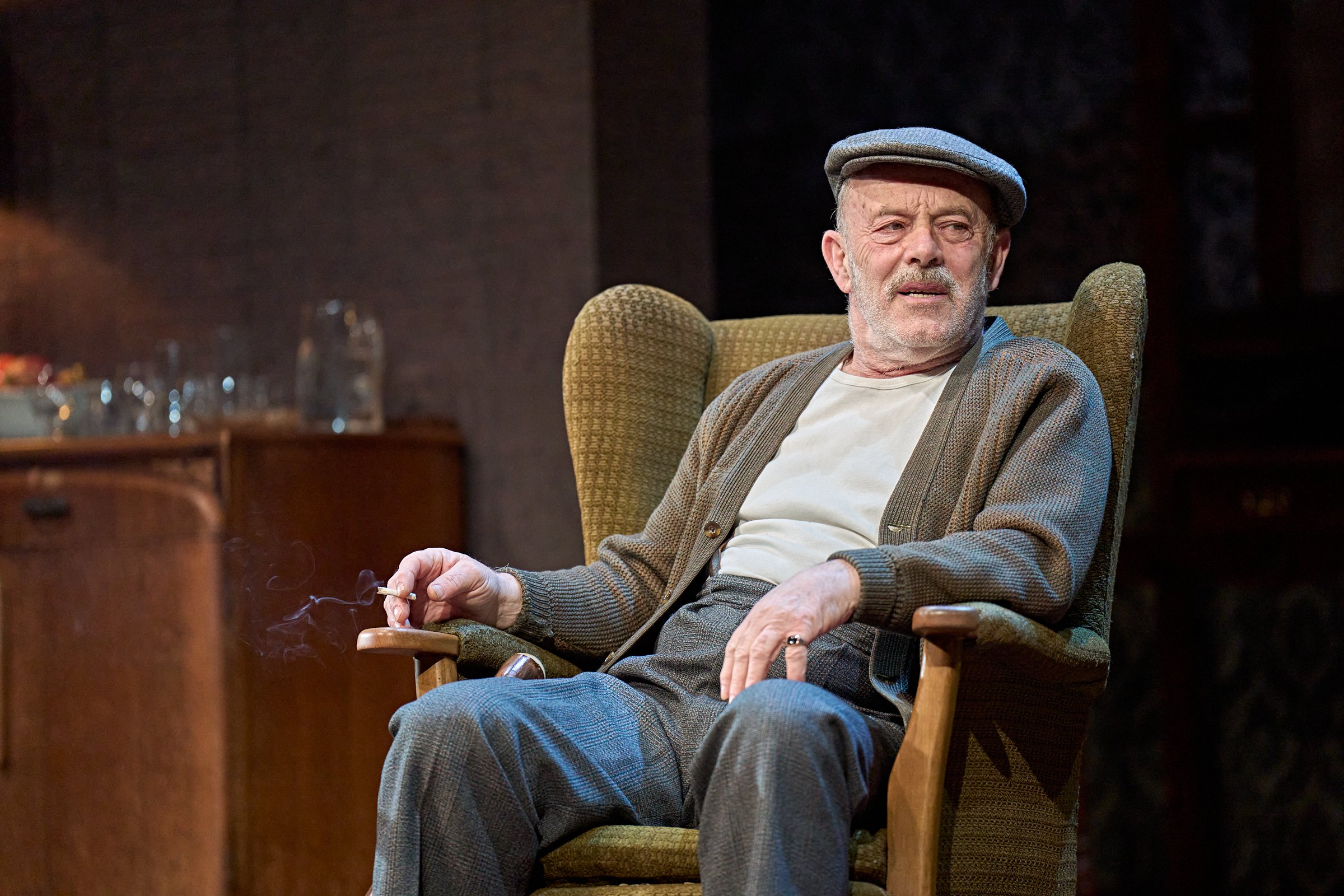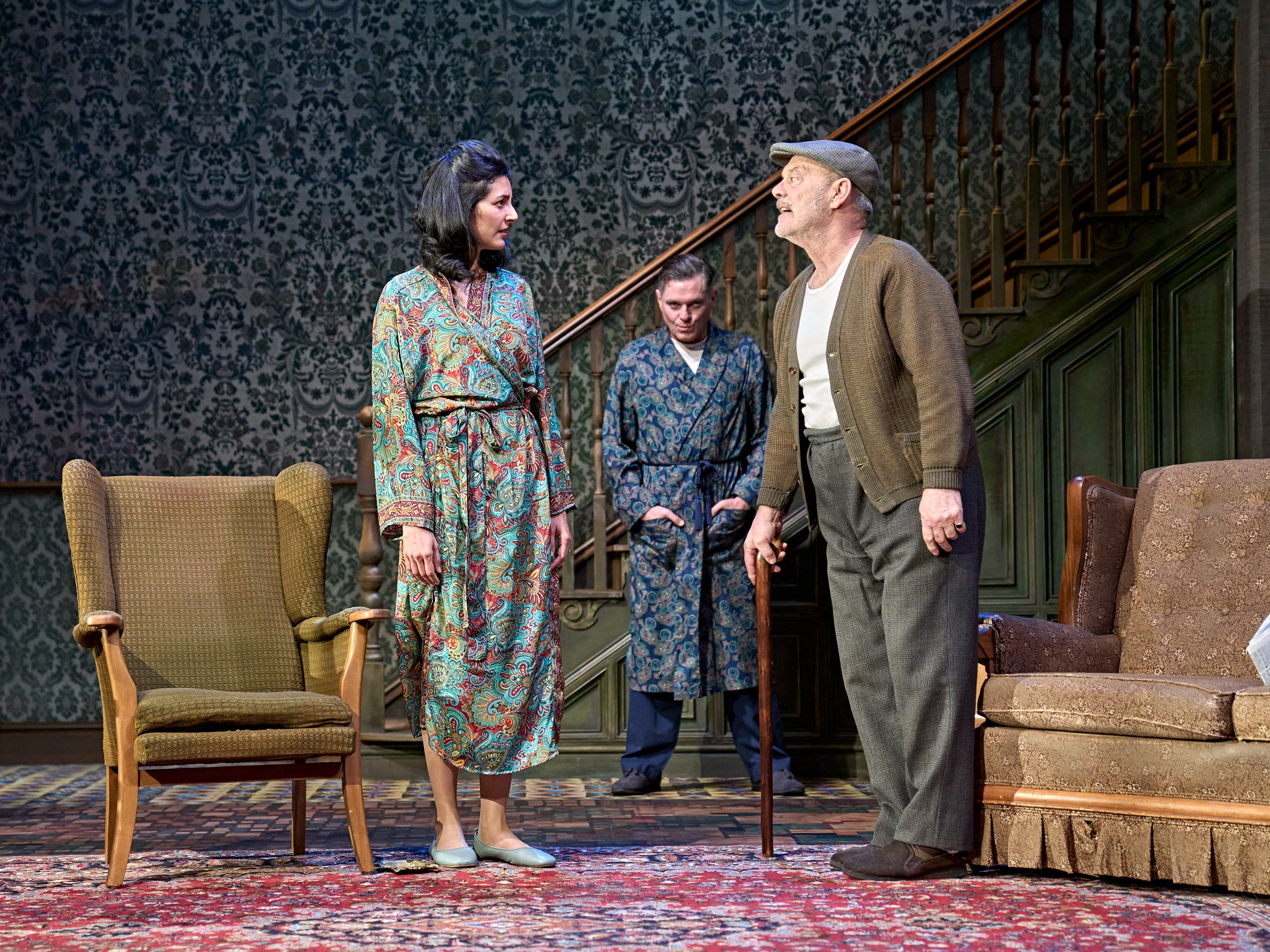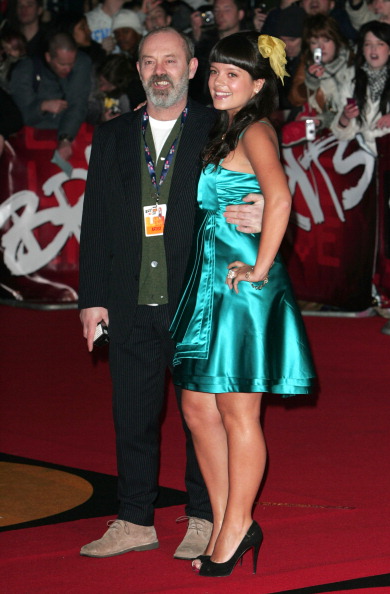
is not feeling well. ‘On Monday I was violently expunging from both ends,’ he reveals as he breaks open a croissant.
‘I thought it was food poisoning’ he says, before narrowing the diagnosis to ‘something in the gastric end of town’.
This is before we begin the cat and mouse game of getting Keith to talk about the most famous of his six children, pop star and now celebrated actor Lily, which every interview must, especially since Lily wrote about her estranged relationship with her father in her memoir My Thoughts Exactly. But first, there is the matter of Keith’s latest stage show.
In the latest revival of Harold Pinter’s 1964 classic The Homecoming, Keith plays terrifying patriarch Max who rules his sons and brother with threats and violence.
This is a characteristic that has informed many a role played by Keith, most recently as a serial killer in The Pembrokeshire Murders, which earned him a
Bafta nomination.
Remarkably, this is the third time Keith has appeared in Pinter’s play. ‘I’ve played Teddy. I played uncle Sam, now it’s my Max time,’ he says. The title refers to the homecoming of eldest son Teddy (Sam Alexander) who for the first time in six years visits the house of his childhood. With him is his wife Ruth (Shanaya Rafaat) who none of Teddy’s family, all men, have met.
Few plays are stranger or tenser. Pinter has a way of turning small talk into mortal threat and as the men vie for the position of top dog, Ruth establishes her place in the pecking order.

It was when Keith played Teddy in 1997 that he began to feel like he belonged in the theatre as an actor. ‘I was thrown in the deep end. I’d f*** up a few lines, go off track and come back. I was used to it because I was basically a stand-up,’ says the actor.
‘But doing that in a Pinter, with Lindsay Duncan [who played Ruth], I can still see Lindsay’s face God bless her.’
‘Stand-up’ doesn’t quite cover Keith’s pursuits. He was a regular presence during the rise of the Comic Strip and Britpop. Then there were the famous hell-raising sessions at the Groucho. Acting was just another string to an already well-strung bow but Pinter seemed to tolerate with good grace this loose cannon in his play.
‘He’d say, “Yes, mostly very good. And certain parts of the play weren’t too bad. But I didn’t write them,”’ says Keith chuckling at the memory as he makes a roll-up. The experience made an actor of him, he says. ‘It was when I learnt the power of keeping still on stage.’
His character, Max, is a father whose relationship with his grown-up children is dysfunctional and estranged. I wonder if he is drawing on his own for the role.
Does it help to be a dad to play a patriarch like Max? ‘No, I don’t think it does. It helps to have had one,’ he replies, quick as a flash.
So is it his relationship with his dad that Keith is channelling? ‘Oh, yes,’ he says, but he is not up for speaking more about his father, a submariner in the Royal Navy.

‘I don’t want to talk about family,’ he says. ‘But my dad’s name was Teddy,’ he adds with emphasis in a way that suggests there are comparisons to be made between the family in Pinter’s play and his own. ‘My dad was a London boy and I can hear his phrases,’ he says without nostalgia.
As for Lily, that’s off limits. ‘Nah, can’t talk about it.’ he says. Did he see her ‘I did. I thought it was alright, actually,’ he says in a way that suggests he thinks her performance was really good. It was actually so good it led to her being nominated for an Olivier award.
He doesn’t like journalists ‘talking about actors and their kids. It makes you out to be some kind of acting family. I can’t bear it.’ OK, but the Allens are a kind of acting dynasty what with Keith’s brother Kevin being an actor, as is Lily’s younger brother Alfie. ‘That’s up to you to determine, not me,’ he says.
The cigarette now rolled, he walks over to a window, opens it and blows out smoke, which a cold breeze blows back in. Rules never were something to be too bothered about for Keith who as a teenager was sent to Borstal. These days he’s more of an artist than rule-breaker.
Keith remembers Pinter as a good bloke who ‘loved a good story’ but someone ‘who abhorred idiocy and ignorance. I’ve seen him turn. I wouldn’t get on the wrong side of him,’ he says. People say that about you, too, I say. ‘Yeah,’ he says blowing more smoke into the wind. ‘They probably do.’
The Homecoming is at until Saturday, and touring.




















